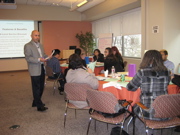California LifeLine training in Oakland
California LifeLine, the low-income telephone assistance program, was the focus of a Consumer Action train-the-trainer event in Oakland in March for community groups.

Consumer Action outreach team members Linda Williams and Nelson Santiago lead the training to help community groups understand how their low-income clients can apply for the discounted telephone service. The participants were from student government, local government, employment development, social services and immigrant support agencies.
California LifeLine provides discounts on basic residential phone service to eligible low-income households. Landline consumers who qualify for California LifeLine residential service pay a fraction of the regular cost for telephone connection and monthly local telephone service. AT&T Director of Regulatory Affairs Jeff Mondon provided an update on the California Public Utilities Commission’s regulatory changes to the program by as well as Federal Communications Commission actions to reform federal Lifeline.
The training was based on Consumer Action’s California LifeLine educational module (To view the complete module, click here.)The materials include a brochure that explains eligibility, the application process and how to renew participation in the program (available in English, Spanish, Korean, Chinese and Vietnamese). The module also includes PowerPoint slides and classroom worksheets. A chart is also available listing companies approved to offer wireless (cell) phone service in California under the federal Lifeline program. AT&T sponsors Consumer Action’s LifeLine project.
“It was a wonderful event and I learned a great deal about the Lifeline program,” said Triet Hoang, outreach specialist of the Itinerant Field Operation Support of the California Telephone Access Program and a participant of the roundtable.
Triet gave a presentation on the California Telephone Access Program (CTAP) and demonstrated the free specialized telephone equipment that is available to California residents who have difficult using standard equipment. CTAP requirements are minimal: eligible consumers must be certified as having a permanent or temporary disability, live in California and have access to telephone service. For more details about CTAP, visit the California Public Utilities Commission website: www.ddtp.cpuc.ca.gov/HomePage.aspx.



